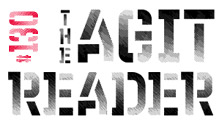
Telling the Truth
Numero Group
It’s no secret that the folks at Numero Group are experts at unearthing rare unheard gems, usually of the soulful variety, yet I’m continuously surprised by the consistency of their efforts. To wit, their latest, Telling the Truth, an album by unknown Willie Wright cut in 1977 at, as pronounced at the beginning of the record, at Variety Recording at 130 West 42nd Street. (The studio gave Wright a reduced rate in exchange for the promo spot.)
Wright’s story isn’t particularly extraordinary in terms of his success, but it shows an independent spirit which wasn’t as common in the ’60s and ’70s as it is today. Wright got his start playing in Greenwich Village at its height in the ’60s, and that scene’s folk influence is clearly palpable. Wright combines soul and folk for a result that’s reminiscent of both Marvin Gaye and Nick Drake (not that Wright had probably heard the latter). Wright ended up with a regular gig at an uptown club, Brandy’s, and when that establishment opened up a Boston outpost, he began making the trek back and forth between Beantown and the Big Apple. Wright eventually moved to Boston and then onto Nantucket when he got a resort gig.
During that time, Wright many made unsuccessful attempts to get signed, but the music bigwigs wanted him to choose one or the other, soul or folk, or were outright confused to begin with. Wright, though, refused to change, and instead opted to start his own imprint, Hotel Records, releasing his debut album, Lack of Education, in 1971. In between that record and Telling the Truth, Wright released a single featuring a cover of Curtis Mayfield’s “Right On for the Darkness” backed with an original called “Africa.” None of the records made any impact, and Telling the Truth was largely distributed to the tourists at Wright’s shows in Nantucket. Wright stopped performing at the age of 41 in 1980 and moved to Providence, Rhode Island.
Of course, what is remarkable about this unremarkable story is the music captured on Telling the Truth. Recorded with his longtime collaborators, drummer George Bragg and guitarist Harry Jensen, who also did time in Jimmy Castor Bunch, Wright created an album that beautifully melds many strains of soul and folk into a style reminiscent of Terry Callier. Willie was obviously cognizant of how out of step with the times this record was in 1977, as he printed a warning on the sleeve that “this is not a dance record” and is “designed for ADULTS of the world.”
Wright himself plays flute in addition to acoustic guitar on the record, and his touches on songs like “Lady of the Year” and the poppy “Love Is Expensive” are particularly evocative. Wright’s voice is rich and resonates enough to fill in the gaps in the relatively sparse instrumentation. Numero has tacked on the two songs from the single, and his version of “Right On for the Darkness” shows that Wright could be just as funky as he wanted to be. Also included is the title track to Wright’s ’71 debut, which shows Wright also melding the blues into his repertoire.
While Numero’s work continues to be solid, Telling the Truth is one of their more amazing discoveries. I’m not sure how they even got their hands on the music as the original tapes were tossed in the garbage when Variety shut down in 1989. However they did it, though, kudos to them.
Stephen Slaybaugh
PAST PERFECTS
Sofrito: Tropical Discotheque
Squirrel Bait, Skag Heaven
Nine Inch Nails, Pretty Hate Machine
Orange Juice, Coals to Newcastle
Tom Petty and the Heartbreakers, Damn the Torpedoes
The New Hope
The Gibson Bros, Build a Raft
The Jon Spencer Blues Explosion, Year One, Extra Width, Orange and Acme
The Church, Deep in the Shallows
Dwarr, Animals
Iggy Pop & James Williamson, Kill City
The Dream Syndicate, Medicine Show
INXS, Shabooh Shoobah
Fela Kuti, "Zombie" Batch, Part II
